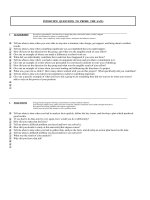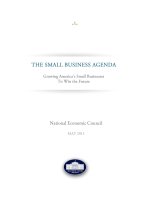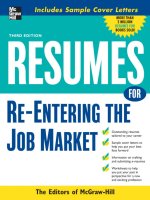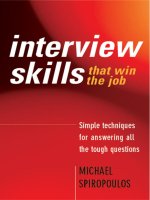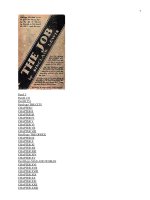Michael spiropoulos interview skills that win the job (2006)
Bạn đang xem bản rút gọn của tài liệu. Xem và tải ngay bản đầy đủ của tài liệu tại đây (1.99 MB, 156 trang )
Interview Skills
that Win the Job
Bh0896M-PressProofs.QX5 2/11/04 1:16 PM Page i Bookhouse
Bh0896M-PressProofs.QX5 2/11/04 1:16 PM Page ii Bookhouse
Interview Skills
that Win the Job
Simple techniques for answering
all the tough questions
MICHAEL SPIROPOULOS
Bh0896M-PressProofs.QX5 2/11/04 1:16 PM Page iii Bookhouse
First published in 2005
Copyright © Michael Spiropoulos 2005
All rights reserved. No part of this book may be reproduced or
transmitted in any form or by any means, electronic or mechanical,
including photocopying, recording or by any information storage
and retrieval system, without prior permission in writing from the
publisher. The Australian Copyright Act 1968 (the Act) allows a
maximum of one chapter or 10 per cent of this book, whichever
is the greater, to be photocopied by any educational institution for
its educational purposes provided that the educational institution
(or body that administers it) has given a remuneration notice to
Copyright Agency Limited (CAL) under the Act.
Allen & Unwin
83 Alexander Street
Crows Nest NSW 2065
Australia
Phone: (61 2) 8425 0100
Fax: (61 2) 9906 2218
Email:
Web: www.allenandunwin.com
National Library of Australia
Cataloguing-in-Publication entry:
Spiropoulos, Michael, 1959- .
Interview skills that win the job: simple techniques for
answering all the tough questions.
ISBN 1 74114 188 5.
1. Employment interviewing. I. Title.
658.31124
Set in 9.5/13 pt Stone Serif by Bookhouse, Sydney
Printed in Australia by McPherson’s Printing Group
10 9 8 7 6 5 4 3 2 1
Bh0896M-PressProofs.QX5 2/11/04 1:16 PM Page iv Bookhouse
This book is dedicated to
Suzanne Smith
for her love and support
Bh0896M-PressProofs.QX5 2/11/04 1:16 PM Page v Bookhouse
Bh0896M-PressProofs.QX5 2/11/04 1:16 PM Page vi Bookhouse
Contents
Contents
Introduction: The path to interview success ix
1 Interview myths 1
2 Convincing them you’re right for the job 11
3 Can you do the job? 22
4 Same skills, different job 42
5 Your potential to tackle new tasks 49
6 ‘Are you the sort of person we can work with?’ 56
7 Employers love motivated employees 67
8 The ‘big five’ questions 73
9 Building rapport and trust 89
10 Effective answers to common questions 129
Bh0896M-PressProofs.QX5 2/11/04 1:16 PM Page vii Bookhouse
Bh0896M-PressProofs.QX5 2/11/04 1:16 PM Page viii Bookhouse
Introduction: The path to
interview success
Introduction: The path to interview success
Interview Skills that Win the Job offers an innovative and exciting
approach to developing interview skills. As well as letting you know
what’s needed to succeed at interviews, it goes one important step
further and demonstrates how you can prepare your own answers
including exercises designed to improve your skills. People who
consistently succeed at interviews are those who take the time to
prepare their own answers rather than simply using answers they
have read or heard elsewhere.
Whether you’re a recent school leaver or a seasoned professional,
this book will show you how to prepare highly effective answers
and how to deliver them in a confident manner whilst establishing
that all-important rapport with interviewers.
The book recognises that one of the major obstacles to successful
interviewing is organising a vast amount of detail about what you’ve
done in previous jobs (or at school or university) and expressing
this information in a clear and convincing way at the interview.
The book has been designed specifically to prevent you from:
• giving those long-winded answers that drive interviewers to
distraction;
• failing to mention important key achievements and kicking
yourself afterwards;
Bh0896M-PressProofs.QX5 2/11/04 1:16 PM Page ix Bookhouse
• being stumped by certain questions and not providing an intel-
ligent response;
• failing to build rapport and trust.
In addition to teaching you how to respond to popular interview
questions and distinguishing a good answer from a bad one, Interview
Skills that Win the Job will go through the specific steps you need
to establish rapport and trust during the course of the interview.
The reason for this is simple: if you fail to establish rapport and
trust, it is highly unlikely that you will get the job—no matter how
technically brilliant your answers are.
The skills and techniques you will develop from reading
this book will remain with you for the rest of your working life.
They will immeasurably improve your chances of winning those
hard-to-get jobs and contribute to a rewarding career.
x
interview skills that win the job
Bh0896M-PressProofs.QX5 2/11/04 1:16 PM Page x Bookhouse
Interview Skills
that Win the Job
Bh0896M-PressProofs.QX5 2/11/04 1:16 PM Page xi Bookhouse
Bh0896M-PressProofs.QX5 2/11/04 1:16 PM Page xii Bookhouse
1
Interview
myths
Interview myths
One important reason people fail at interviews is because of several
misconceptions, or myths, about what really happens during the
course of an interview. All of us know that the purpose of interviews
is for an interviewer to hire someone who will perform well in a
particular job, but beyond that few people fully grasp how interviews
really work and what makes one candidate stand out more than
another. This lack of understanding represents a major obstacle to
maximising performance when sitting before an interviewer and
trying to give your best answers. Interviews are no different to other
endeavors in life: the better you understand how they work (or don’t
work), the higher the probability of tackling them successfully. An
understanding of the underlying dynamics inherent in most
interviews is an important start to improving your interview
performance.
Myth no. 1: The best person for the job gets it
Sometimes this is true—especially in a situation where everyone
knows everyone else, such as when a company is recruiting internally.
However, this is often not the case. In order for the best person for
the job to win it, a number of very important things need to be in
place (and even then, there’s no guarantee). These include:
Bh0896M-PressProofs.QX5 2/11/04 1:16 PM Page 1 Bookhouse
• The interviewer knows what questions to ask and how to search
for the truthfulness in answers. These two things may sound
simple enough, but I can assure you that a large proportion of
people conducting interviews have received no training, lack
interview experience and often do not even go to the trouble of
preparing for the interview.
• The interviewer is not taken in by the charm, good looks, great
humour or any other aspect of the interviewee. This can be a
difficult obstacle, even for experienced interviewers.
• The interviewee has learned how to clearly articulate their skills,
key achievements and how they can add value to the organisation.
• There is no personality clash between interviewer and interviewee.
• Neither party is having a bad day.
Some employers—usually the ones who have been badly burnt
by hiring the wrong people in the past—go to great lengths to set
up professional hiring procedures designed to minimise hiring
mistakes. Whilst some of these procedures are effective in improving
candidate selection, they do not guarantee that the best person for
the job will actually win it. In the final analysis, choosing someone
for a job involves at least one human being making a decision about
another, and no matter what we do to eliminate subjectivity, as
human beings it is impossible to put aside our predispositions,
predilections and personal preferences—no matter how much we
may try to.
In an ideal world, the best person for the job would always win it;
however, the reality is that it is often the person who performs best
at the interview who wins the prize. The important lessons here are:
• Don’t automatically pull out of applying for a job if you know
someone better suited for the job is also applying for it. If you
go to the trouble of preparing properly for the interview, there’s
a good chance that you may be seen as the preferred candidate—
especially if the other person takes the interview for granted and
fails to prepare.
• If you happen to know that you’re the best person for the job,
avoid taking the interview for granted. Behave as though you’re
2
interview skills that win the job
Bh0896M-PressProofs.QX5 2/11/04 1:16 PM Page 2 Bookhouse
competing against formidable rivals. Take the time to prepare
properly. Just because you’ve got a lot of experience does not
mean you know how to convey this message at an interview.
Myth no. 2: Interviews are like school exams—
the more you say, the better you’ll do
Yes, interviews are a bit like exams in so far as that you’re asked a
number of questions to which you need to respond intelligently,
but there the similarities end. Unlike exams, where lots of accurate
detail is important, interviews are more about interacting and rapport
building whilst simultaneously articulating smart answers. And a
smart answer is often not the most detailed. In fact, long and overly
detailed answers can drive interviewers to distraction, despite their
technical accuracy. Knowing when to stop talking is a skill all
successful interviewees have.
Also unlike many exams, there are often no right or wrong
answers in interviews. We’re all different and come to interviews
from different backgrounds and business sitations. What is important
at an interview is to justify your actions and talk about your
achievements in a confident manner.
Myth no. 3: Interviewers know what they’re doing
Some interviewers are very good at what they do, especially full-
time professionals (provided they’re not suffering from interview
fatigue). However, many managers and owners of small businesses
often flounder because interviewing is not something they do on a
regular basis. Some sure signs of a bad interviewer are:
• They do most of the talking.
• They sound as though they’ve made up their mind about you
in the first five minutes.
• They seem to pluck their questions randomly out of the ether.
• Their phone keeps ringing and they answer it.
3
interview myths
Bh0896M-PressProofs.QX5 2/11/04 1:16 PM Page 3 Bookhouse
• They sound like very sharp and less-than-honest salespeople
when it comes to selling the job.
Some sure signs of a good interviewer are:
• They have their questions carefully prepared in advance.
• They want to know what you’ve done and how you’ve done it,
including specific examples.
• They let you do most of the talking.
• They may want to interview you more than once.
• They will try to make you feel at ease.
• They are genuinely interested in your accomplishments, skills
and the type of person you are.
Inexperienced interviewers generally don’t ask the right questions
and can easily be swayed by factors that have little to do with your
ability to perform in the job. So if you are being interviewed by an
inexperienced interviewer, don’t wait to be asked a good question—
one that will allow you to talk about all your wonderful skills and
qualities. Rather, take the initiative in as unobtrusive a way as possible
and talk about the things you feel the interviewer might really want
to know. Unfortunately, this may not always be possible—especially
if you’re being interviewed by a forceful personality who loves the
sound of their own voice. If ever you find yourself in such a situation,
don’t panic. Remind yourself that interviews are just as much about
rapport-building as they are about answering questions. So nod your
head, smile and make all the right noises—talkative interviewers
love people who agree with them.
Myth no. 4: Never say ‘I don’t know’
Interviews are about making a positive impression by answering
questions intelligently and building rapport with the interviewer.
To this end, many interviewees feel that they have to provide the
perfect answer to every question put to them, irrespective of whether
or not they actually know the answer. Clearly, a great interview is
one in which you can answer all the questions (and you should be
4
interview skills that win the job
Bh0896M-PressProofs.QX5 2/11/04 1:16 PM Page 4 Bookhouse
able to do so if you take the time to prepare correctly); however, if
you don’t know the answer to something, it is better to admit to it
rather than pretend to know and start waffling. Most interviewers
can pick waffling a mile away and they don’t like it for a couple of
very important reasons: first, it is likely to make you sound dishonest;
and second, it will make you sound considerably less than intelligent.
You may as well not attend the interview if you give the impression
that you’re neither honest nor bright.
Trying to answer a question that you have little idea about could
undermine an otherwise great interview. This does not mean that you
cannot attempt answers that you are unsure of. There’s nothing wrong
with having a go, as long as you make your uncertainty clear to the
interviewer at the outset. Here’s what an answer may sound like:
I have to be honest and say that this is not an area I’m familiar
with, though I am very interested in it. If you like, I’m happy
to have a go at trying to address the issue, as long as you’re
not expecting the perfect answer.
Or:
I’d love to answer that question, but I need to be honest
upfront and say that this is not an area that I’m overly familiar
with, though I’m very interested in increasing my knowledge
about it.
Myth no. 5: Good-looking people get the job
I suppose if the job was for a drop-dead gorgeous femme fatale type
in a movie, then good looks would certainly help, but for most other
jobs the way you look is not as big a deal as many people make out.
As we’ve already discussed, there will always be an inexperienced
employer who will hire on the basis of superficial factors, but most
employers are smarter than that. The claim that good-looking people
get the job over plain-looking people makes one seriously flawed
assumption—that employers make a habit of putting someone’s
good looks before the interests of their livelihood. All my experience
5
interview myths
Bh0896M-PressProofs.QX5 2/11/04 1:16 PM Page 5 Bookhouse
has taught me the contrary. Most businesses find themselves in
highly competitive environments and employers are only too keenly
aware that a poor hiring decision can prove very costly.
This is not to say that appearance and a bright personality are
not important factors at an interview. It is very important that you
dress appropriately and try your best to demonstrate all your friendly
qualities. Good looks are certainly overrated in interviews, but an
appropriate appearance and a friendly personality are not.
Myth no. 6: If you answer the questions better than
the others, you’ll get the job
Being able to articulate good answers in an interview is very important,
and failure to do so will almost certainly mean you don’t get the
job. However, interviews—as we’ve already seen—are much more
than just giving good answers. They’re also about convincing the
interviewer that you will be a nice person to work with. To put it
another way, it doesn’t matter how good your answers are technically,
if the interviewer doesn’t like you there’s not much chance you’ll
get the job (unless your talents are unique, extremely difficult to
find or the interviewer is desperate).
So avoid thinking about interviews just in terms of answering
questions correctly. Interviews are also about establishing rapport
and trust, and whilst there is no fail-safe method in doing this, there
are things you can do (and things you should not do) that will go
a long way towards improving your skills in this all-important area
of interviewing.
Myth no. 7: You should try to give the perfect answer
I’ve heard too many people stumble over their words, repeat
themselves and talk in circles because they’re trying to articulate
the perfect answer—or what they think constitutes the perfect answer.
Some people are so obsessed with delivering the perfect answer that
6
interview skills that win the job
Bh0896M-PressProofs.QX5 2/11/04 1:16 PM Page 6 Bookhouse
they don’t stop until they produce what in their opinion is a word-
perfect response.
Because we can never be entirely sure of what the interviewer
wants to hear, some of us will keep on talking in the hope that we’ll
cover all bases. The problem with this approach is that we end up
talking too much, leading to the interviewer losing concentration—
which, of course, is the last thing you need at an interview. The
reality is that in most cases there is no such thing as the perfect
answer. The lesson here is: it makes a lot of sense to settle for a good
answer that gets to the point rather than meander all over the place
searching for the elusive perfect answer.
Myth no. 8: You must ask questions to demonstrate
your interest and intelligence
Many interviewees are under the mistaken belief that they must ask
questions at the end of the interview. There seems to be a common
belief amongst many interviewees that this makes them sound more
intelligent as well as more interested in the job. This is not true.
Asking questions simply for the sake of doing so won’t improve
your chances of getting a job. It could even make you sound a little
dull—especially if you ask questions about matters that were already
covered during the course of the interview.
Only ask a question if you have a genuine query. Acceptable
questions include those relating directly to the job you’re applying
for, as well as working conditions and company policies on such
things as on pay, leave, and so on. Interviewers never mind answering
questions about such matters, but they do mind answering questions
they perceive to be irrelevant. If you have no questions to ask, simply
say something like: ‘Thankyou, but I have no questions. You’ve been
very thorough during the course of the interview and have covered
all the important matters regarding the job.’ There’s nothing wrong
with including a compliment to the interviewer about their
thoroughness and professionalism—provided it doesn’t go over the
top or sound like grovelling.
7
interview myths
Bh0896M-PressProofs.QX5 2/11/04 1:16 PM Page 7 Bookhouse
Two further points need to be made about asking questions. First,
avoid asking too many questions. On the whole, interviewers do
not enjoy role reversals. Second, never ask potentially embarrassing
questions. These can include:
• a question relating to a negative incident;
• something that’s not supposed to be in the public domain;
• a difficult question that may stump the interviewer.
The rule of thumb is: if you think a question may cause
embarrassment, err on the side of caution and avoid it.
Myth no. 9: Relax and just be yourself
Whilst it is important to be relaxed and show your better side, it is
also very important to understand that interviews are not social
engagements. Most interviews are highly formalised events in which
otherwise innocuous behaviours are deemed unacceptable. In short,
being your usual self could spell disaster (as contradictory as that
may sound). For example, if being yourself means leaning back on
your chair, dressing somewhat shabbily and making jokes, you might
find yourself attending an inordinate number of interviews. Whilst
interviewers like people to be relaxed, they also have definite
expectations about what behaviours are appropriate for an interview—
and you violate these expectations at your peril!
Myth no. 10: Interviewers are looking for flaws
The danger with this myth is that it can easily lead to interviewees
adopting a defensive, perhaps even distrustful, attitude during the
interview. If you believe that the interviewer is assiduously searching
for your flaws, it will more than likely undermine your attempts to
establish that all-important rapport and trust. It may also prevent you
from opening up and giving really good answers. Rest assured that
most interviewers do not prepare their interview questions with a view
to uncovering your flaws. Questions are mostly prepared with a view
8
interview skills that win the job
Bh0896M-PressProofs.QX5 2/11/04 1:16 PM Page 8 Bookhouse
to giving the interviewer an overall or holistic insight into what you
have to offer the company. A good interviewer will indeed uncover
areas in which you are not strong, but that is a far cry from thinking
that the interviewer is hell bent on uncovering only your flaws.
It is very important to treat every question as an opportunity to
excel rather than being unnecessarily guarded. It is only by answering
the questions that you can demonstrate how good you are. To treat
questions as objects of suspicion makes no sense at all.
Understanding the myths surrounding interviews gives you a great
start for success. Remember, interviews are no different to other
endeavors in life: the better you understand their underlying nature
the higher the probability you’ll tackle them successfully. An insight
into common interview myths will arm you with the information
you need to prevent you from falling into those disheartening traps.
Just as importantly, a clearer picture of the true nature of interviews
better informs the rest of your preparation and will contribute to
your confidence and performance.
Summary of key points
• The best person for the job does not necessarily win it—often it’s
the person who gives the best interview.
• Interviews are more than just giving technically correct answers.
They’re also very much about building rapport.
• Not all interviewers know what they’re doing; your job is to know
how to handle the good and bad interviewer.
• It’s better to be honest and admit ignorance than try to pretend you
know ananswer andcome acrossas disingenuousand lessthan bright.
• Good looking people win jobs—maybe in Hollywood movies, but
on the whole, employers are keen to hire talent over superficial factors.
• Striving to give the perfect answer can get you into trouble. It’s better
9
interview myths
Bh0896M-PressProofs.QX5 2/11/04 1:16 PM Page 9 Bookhouse
to give a good answer that’s to the point rather than searching for
perfection; besides, often there’s no such thing as the perfect answer.
• Do not ask questions for the sake of it. Only ask a question if you
have a genuine query that has not been covered.
• Interviews are formal occasions requiring relatively formal behaviours.
Interviewers will expect this and may react negatively if they don’t
see it.
• Interviewers do not spend all their time looking for your flaws. They’re
more interested in getting an overall picture of who you are. Avoid
answering questions defensively. It’s much better to see every question
as an opportunity to highlight your best points.
10
interview skills that win the job
Bh0896M-PressProofs.QX5 2/11/04 1:16 PM Page 10 Bookhouse
2
Convincing them
you’re right for the job
Convincing them you’re right for the job
Doing well at interviews is not nearly as difficult as many people
think. With correct preparation and a little practice, most people
who dread interviews can learn to excel. The important thing to
note is that performing well at interviews is a learned process. Highly
effective interviewees are not born with interview skills; rather, they
teach themselves what to say, how to say it and how to behave
during an interview.
Common interview mistakes
All of us have made mistakes during interviews, and most of us have
walked out of interviews thinking of all the great things we forgot
to mention and all the things we shouldn’t have said. But the most
important thing about mistakes is learning from them—and not
repeating them. Here are some common interview mistakes:
• Failing to express oneself clearly. Often, because of anxiety and
wanting to say things perfectly, we try too hard and turn what
should be simple sentences into convoluted nonsense. Simple
language is always the most effective. Avoid trying to sound
knowledgeable by using jargon or complex sentences.
• Not being aware of one’s body language. Many interviewees suc-
ceed in alienating the interviewer because they pay little or no
Bh0896M-PressProofs.QX5 2/11/04 1:16 PM Page 11 Bookhouse
attention to their body language. Body language is an extremely
powerful communicator, and failing to use it effectively will
almost certainly put you at a significant disadvantage. Eye con-
tact, sitting position and facial expressions are all very important
aspects of interviewing, and need to be thought through before
the interview.
• Failing to control those nerves. Sometimes people allow their nerves
to get so out of control that they fail to establish rapport and
even forget their answers. Feeling anxious before and during an
interview is common. In fact, a touch of nerves can be a good
thing. But there is no need to be the victim of debilitating nerves.
As you read through this book, you’ll gradually learn how to
lessen your anxiety.
• Failing to give appropriate examples. Failing to give examples, or
giving inappropriate examples, will spell disaster. Before the
interview, it is important to think of relevant examples of what
you’ve achieved and how you went about realising those
achievements. Saying that you achieved something without
being able to back it up with specific examples will only get you
a rejection letter. Your examples need to be easy to understand,
follow a logical sequence and be relevant to the needs of the
employer. None of this happens without preparation.
• Trying too hard to please the interviewer. Whilst building rapport
and trust during the interview is critical, few interviewers appre-
ciate interviewees going overboard with their behaviour.
Obsequious behaviours are generally seen as a form of deceit and
carry little weight—in fact, they can undermine your efforts to
create trust.
There’s nothing wrong with you
You’ve probably committed at least some of the mistakes listed
above. It’s very important to realise that making such mistakes is
common. In other words, there’s nothing wrong with you. In the vast
majority of cases, performing poorly at an interview happens because
12
interview skills that win the job
Bh0896M-PressProofs.QX5 2/11/04 1:16 PM Page 12 Bookhouse
